Source: Commons
Since the beginning of the full-scale war, we have published numerous critical texts about those leftists who have got stuck in the past and keep seeing the war as just another confrontation between Western and Russian imperialism. Some adhere to this idea due to sincere beliefs; others simply choose a more comfortable position of not intervening or even searching for arguments against the support of Ukrainian resistance (‘nationalism,’ ‘protection of Russian-speaking people,’ ‘promotion of NATO,’ etc.). Westplaining[1] helps them close their eyes to the whole picture.
This text, though, will finally be about the bright side of the global left – those who show solidarity with Ukraine. A huge number of left-wing activists around the globe have been holding events in support of Ukraine, translating Ukrainian texts, providing humanitarian aid (including that for the military) and organising important campaigns: against the attack on labour rights in Ukraine, for the external debt write-off and for the supply of weapons.
We spoke to leading leftist organisations and initiatives that support Ukraine in these difficult times. This list is far from exhaustive: there are dozens of other groups that engage in humanitarian or political activity to help the Ukrainian people.
Zofia Malisz, a member of Razem International
Razem is a parliamentary progressive left party in Poland. Since the beginning of the war, the party has taken a principled position of supporting the Ukrainian resistance. On 7 March, at the initiative of Razem, the left-wing parties of Eastern Europe gathered in Warsaw and published a strategic statement, ‘European Left Solidarity with Ukraine.’ The statement calls, in particular, for the supply of military equipment and humanitarian aid to Ukraine, as well as for the country’s foreign debt to be written off.
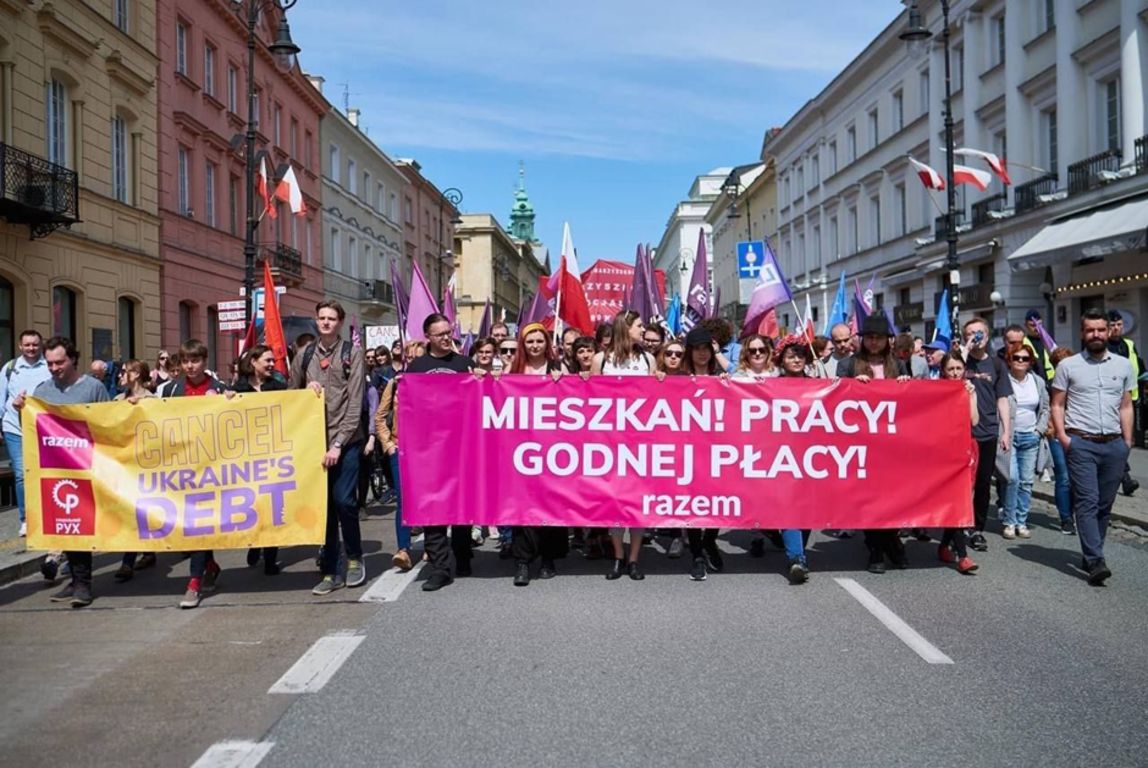
How has the Polish left helped Ukrainian society since the beginning of the full-scale invasion?
Razem reacted quite actively and decisively. We have unequivocally (sometimes even by Polish standards) taken a stance on the side of Ukrainians. The news that Razem left[2] Progressive International due to the conflicts on the issues of invasion and Ukraine’s independence had a lot of attention and influence in the debate about Ukraine.
In the first hours of the invasion, Razem was one of the first parties to take a stance to support Ukrainian society. In the first days, we intensified contacts with the Ukrainian left from Sotsialnyi Rukh, to listen to and have a dialogue with an ideologically close political orginisation in the region – to understand the situation better. The following week, we held very intense campaigns together where we pushed international organisations and parties to convince them that Ukraine has to be armed.
Regional left parties gathered on 8 March in Warsaw to coordinate our actions in the region. In our statement we also demanded for the cancellation of Ukrainian debt, and starting from there, we intensified our lobbying effort together with Sotsialnyi Rukh. We reached out to the foreign policy advisor of Bernie Sanders; we connected to the people in Congress; we were in touch with UK MPs and parliamentarians from Finland and Portugal. All that to bring about resolutions in national parliaments and legislative efforts to exert pressure on the private and state lenders to cancel or at least postpone the payment of Ukrainian debt.
Razem attempted to take a piece of the Sotsialnyi Rukh’s huge effort on the level of European national parliaments, and we succeeded. We then attempted the same with the Polish parliament, trying to push for a similar resolution to those adopted by the US House of Representatives or the UK parliament. However, it was frozen by the Polish conservative government.
With our partners worldwide, we coordinated a social media campaign, which spread rapidly on social networks. Then, we learned that congressman Garcia introduced a bill to lobby for the cancellation of Ukrainian debt. We were happy with this development. American influence was responsible for cancelling Polish debt, so it was a significant step.
Apart from all of this political support and realignment, the mobilisation of Polish society was extremely strong. Many of our activists have been active in various initiatives where they provide support to refugees and mobilise others to help those reaching Poland. Distributing food at railway stations, collecting money and essential products, and organising convoys are some of the common activities. At least one of our MPs is now hosting Ukrainian refugees. It is not that he is special – rather, it reflects the general mood of Poles and the Polish left.
Left parliamentarians from our coalition have tried to help make life easier for Ukrainian women. There is a [near-total] abortion ban in Poland with only a few ‘exceptions’ such as pregnancy as a result of rape.
Female MPs were trying to introduce an amendment to abortion laws which would accelerate the process for Ukrainian women [raped by Russian soldiers]. The amendment was rejected by the parliamentary majority.
The war brought anti-campist left and generally progressives together. More connections and contacts were established in the situation of the Russian war in Ukraine. Is it important for the left?
I think there is a total realignment. I think it was a paradigm shift in terms of a very significant moment. Everything changed overnight. This is an existential and fundamental issue. Not only for the Ukrainian left, but for the whole Eastern European and Nordic countries, for all countries that have been under the threat of Russian imperialism. It was an automatic instinctive movement of those who were in a close relationship before, but it became a lot closer within hours. An immediate intensification of contacts on the CEE left. Putin gave us a reason to talk with each other more. In these conversations, we found that obviously, we have a lot more other things in common where we can help each other.
It is not an exaggeration to say that it is the war in Ukraine that has bound the left in Central and Eastern Europe. Could you tell us more about these new links?
When we met at the Razem Congress in June, it was the first step toward closer cooperation. All leaders could talk, discuss. I think it was a very significant moment for the regional left.
This closeness of EE, Baltic and Nordic left is happening on the ground of the resistance to imperialism everywhere, solidarity with sovereign countries, with the people and working class who want to determine their own fate everywhere. This is why we met not only with the regional left, but with those from the Kurdish HDP, from the BDS movement, Palestinians, and also with our friends from PSOL, Brazilian socialists.
This paradigm of some of the western left that has revealed itself to me is very reactionary, unmodern and unfair. It has revealed itself among the western left who are somewhat stuck in 1968. It is going away, and the international left can stand for itself, and not just in itself, but in its newfound solidarity with each other, it is ready and willing and finds it very important to stand up in solidarity with Palestinians, Syrians, Hong Kong and with everybody who is fighting for their rights and resisting against imperialism.
Everybody was aware that it was a crucial moment.
European Network for Solidarity with Ukraine (ENSU)
ENSU, the European Network for Solidarity with Ukraine, is an inter-organisation platform which, since the beginning of the war, has gathered around the ideas of the need to support Ukraine’s armed resistance to the Russian invasion. As a reaction to the ‘pacifist’ left, the initiative has focused on promoting weapons supply, and solidarity with the people of Ukraine, doing everything to ensure the voice of the Ukrainian left is heard.
ENSU unites all the different leftists around the globe from the Trotskyist United Fourth International to the parliamentary democratic-socialist left parties. Thanks to the platform’s activity, left solidarity marches are held in European countries every month, the feminist manifesto ‘The Right to Resistance’ was translated and distributed, and a collection of signatures and letters from influential trade unionists and deputies was organised with the demand to stop the attack on labour rights in Ukraine.
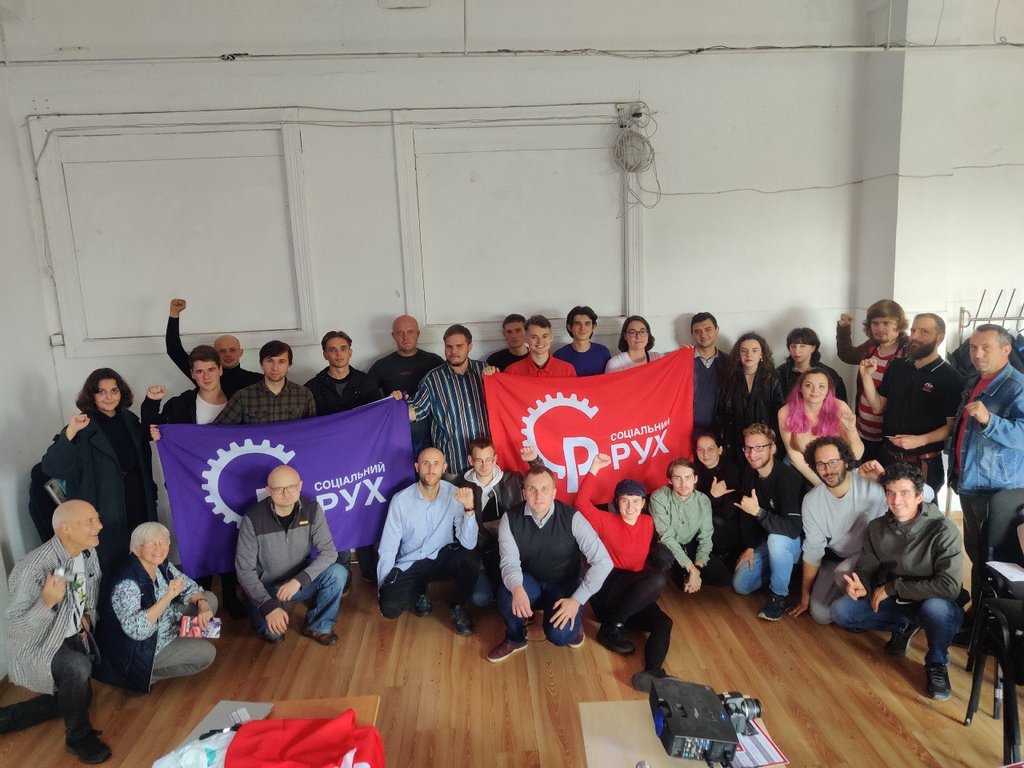
Adam Novak, ENSU coordinator, and Elisa Moros, ENSU feminist group activist
How and for what purpose was ENSU created? What kind of solidarity can the left offer to Ukraine?
Adam: ENSU was created to mobilise support for Ukraine’s resistance to Russian imperialism. ENSU’s founders and members are opposed to all imperialisms, but support the right of oppressed peoples everywhere to seek military, economic and diplomatic support from their invader’s enemies. ENSU has about 1,000 members, mostly in Europe and Latin America.
Perhaps our main solidarity is to bring the voices of Ukrainian progressives to the attention of foreign audiences, who get most of their news from mainstream western news or Russian propaganda.
We try to convince western left activists that Russia is in no way anti-imperialist and that Ukrainian society deserves our solidarity irrespective of our disagreement with the oligarchs or the ultranationalists, conservatives and neoliberals in the Ukrainian parliament. Unfortunately, some western leftists believe that only western imperialism is a problem, so their solidarity with Ukraine is weak if not absent.
What does ENSU do, and what are the achievements of its campaigns: a petition against anti-labour laws, solidarity rallies?
ENSU publishes, translates and shares information created by and about Ukrainian resistance, its anticapitalist and feminist struggles in more than 15 languages.
Our labour solidarity group brings together networks organising material aid convoys as well as petitions against labour law reform.
Our feminist group supports all areas of Ukrainian feminist resistance, as well as reproductive rights in Poland and other countries where Ukrainian women and girls have taken temporary refuge.
Our refugee working group promotes the temporary protection standards as a new norm that should be applied to all groups fleeing to Europe.
We are worried that Russia will manipulate oil and gas issues as winter approaches, encouraging cowardly and opportunist politicians to call for the partition of Ukraine – ‘peace at any price’ in exchange for Russian gas. Therefore we recently started networking with environmental groups and consumer protection activists to argue for accelerating the green transition.
Does Ukraine need specific feminist solidarity? What topics do you bring up and why do you think it is important?
Elisa: First of all, the war in Ukraine is, like all wars, gendered. The most striking aspect is the use of rape as a weapon of war by the Russian military. But beyond this terrible form of violence specifically aimed at women, this conflict is gendered on many levels. The centralisation of power and only-male conscription reinforce the sexual division of labour, re-assigning women to social reproduction. The extensive destruction following the full-scale invasion is having (and will be having) a huge impact on social reproduction and thus on women’s work. Gender-based violence has increased significantly in the context of gender reinforcement linked to militarisation and weapons circulation. Finally, the situation has produced millions of displaced women exposed to overexploitation and all kinds of violence.
At the same time, women, far from being mere victims of this war, are political actors in their own right whose work is essential to the Ukrainian resistance. They are participating very actively in the resistance, some of them are fighters. But mainly, they are disproportionately in charge of the social reproduction labour, which is just as essential to the Ukrainian resistance as the much more recognised and waged defence labour.
How are ENSU and other left-wing feminist organisations helping Ukraine in the context of full-scale invasion?
Elisa: Our aim in the ENSU is to organise solidarity with the progressive sectors of the Ukrainian resistance. By providing material support, as is the case with the various fundraisers we have organised in different frameworks or the trade union convoys. On the other hand, by translating and promoting the demands of the Ukrainian leftists and feminists. There is a real difficulty for many leftists and feminists internationally to concretely practice solidarity with the Ukrainians. We want to push them out of this paralysis. In order to do so, our strategies are varied and diverse, from confrontation to cooperation.
For example, in the Feminist Collective of ENSU, we have supported the Manifesto of Ukrainian feminists ‘The right to resist.’ Also, we have launched an appeal for the right to abortion for Ukrainian women which has allowed us to build links and obtain support on this particular issue from many pacifist feminists who are opposed to arms deliveries. We are organising fundraisers and we see that even if many leftists/feminists oppose arm deliveries, they are ready to materially support specific political and humanitarian work or to stand in solidarity with specific issues related to refugees, the struggle for workers’ rights in wartime, the cancellation of the debt, etc.
Why it is still important, after 6 months of the invasion, to speak about Ukraine, feminism and war?
Elisa: It is all the more important to continue to speak about these issues as the media coverage is decreasing and the situation risks are becoming normalised or trivialised over time, as is the case with many other armed conflicts. It will be important to keep speaking about it as long as Ukrainian resistance is mobilised. And it will be important to continue to talk about it even after the war, and even in the event of a Ukrainian victory, which I hope for with all my heart. In the best scenario, which would be a quick victory of Ukraine, the victory for feminism will not mechanically follow, for as long as there will be struggles, there will be the need for solidarity.
Ukraine Solidarity Campaign (USC)
USC is a British platform for Solidarity with Ukraine that has been active for many years providing political, media and humanitarian support. It was created by the British left during Euromaidan. They repeatedly helped Ukrainian workers in protests against oligarchs and big business, and supported the Ukrainian people in the fight against Russian aggression.
Chris Ford is a trade union activist, historian of Ukrainian left-wing movements and a founder of the Ukraine Solidarity Campaign.
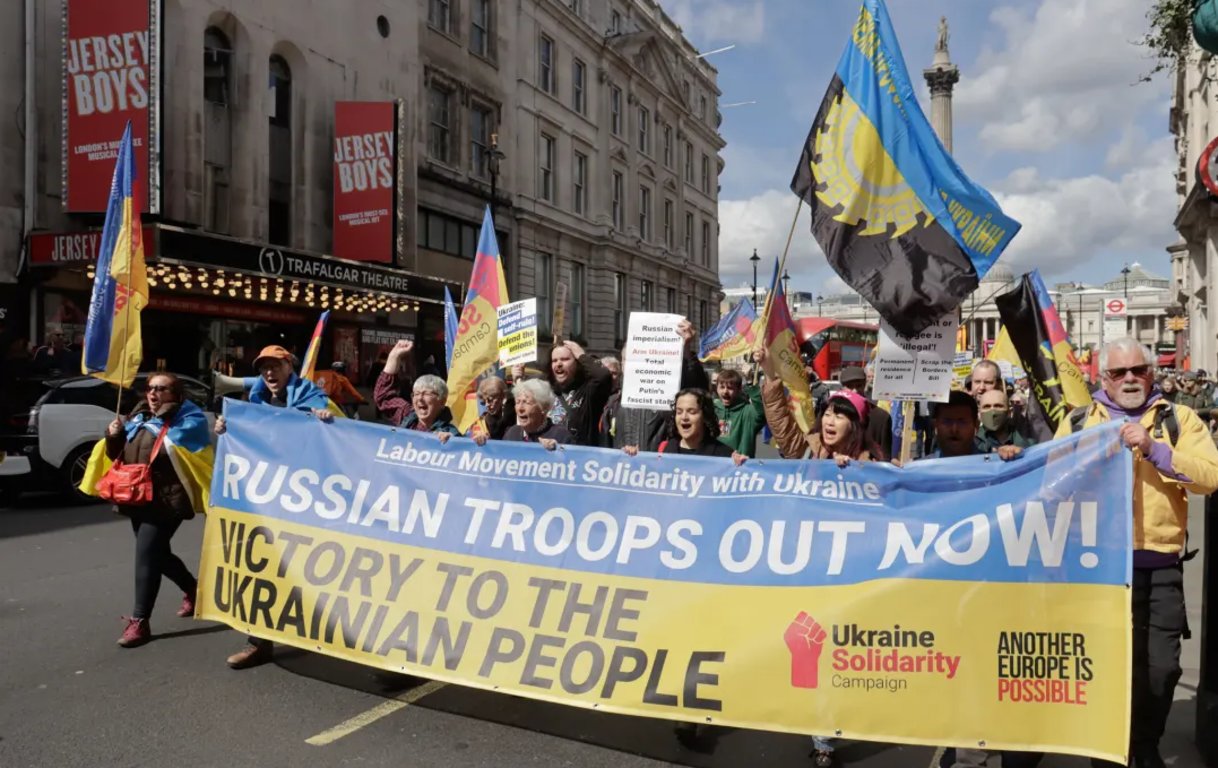
How has USC’s activity changed after the full-scale invasion? Why is it important to have such campaigns in the west?
Our campaign began some time ago in the time of Euromaidan. It became apparent for some of us that we were facing a real crisis on the left at the time – and it continues today. What was very concerning to me was that among those on the left who were anti-stalinist and in solidarity with the oppositional forces in Eastern Europe, like Solidarnosc, many people now moved in a very negative way in the alignment with the Communist party, and with the people, who were adopting arguments and narratives which were similar with the old stalinist’s views on Ukraine.
This had widespread support in some trade unions and on the left. Unfortunately, we saw people from whom we wouldn’t expect, started militantly adopting such awful positions, supporting such charlatan organisations as Borotba and the CPU.
So I organised the meeting with MP John Macdonnell and attempted to bring people who are on the traditions of anti-stalinism on the left, who defended the rights of historically oppressed nations and who were strongly against Russian imperialism. We practically brought two groups of people: those who had been on the Ukrainian left in the diaspora, Marko Bojcun, Mick Antoniw and those on the anti-stalinist left, who were supporting Maidan and saw it as a popular rebellion. We set a campaign that would defend the rights of self-determination of Ukraine against Russian imperialism.
Our first struggle was with the workers in the Kryviy Rih. We tried to focus on the social dimension of what was happening on the Maidan and to support its progressive forces. We also opposed and highlighted the oppression of Crimean Tatars in annexed Crimea and tried to show the reactionary nature of the anti-Maidan movement and the movement in the Donbas both by Russian nationalists, oligarchs and intervening russian forces. We tried to show the killings and suppression of trade unions.
Our campaign was very successful, and two trade unions moved to support us. One national union unfortunately supported so-called ‘solidarity with anti-fascist resistance in Ukraine,’ taking a pro-separatist position.
Now not one of them has such a position. No trade union in Britain backed the position of ‘Stop the war’ (a British union of left activists taking a ‘pacifist’ position and calling against the supply of weapons to Ukraine) and stalinists. Trade unions represent the biggest part of UK society, and their support for Ukraine is absolutely crucial.
In some places, we have good cooperation between our campaign and the old diaspora, and very important, new refugees: we were helping them and campaigning together. Unfortunately, it could be a long war, with negative effects globally, so we need to counter those who want to undermine support for Ukraine, and we cannot do this if we speak only inward.
Solidarity from Wales: Mick Antoniw’s trip
Mick Antoniw, USC activist, Welsh Labor Member of Parliament, General Counsel for Wales and Minister for the Constitution, and a member of the Ukrainian diaspora, helps Ukraine in political and other activities. Recently, Mick Antoniw and a group of British trade unionists went to Ukraine to deliver a car, military equipment and medical supplies to Ukrainian trade unionists currently in the Armed Forces.
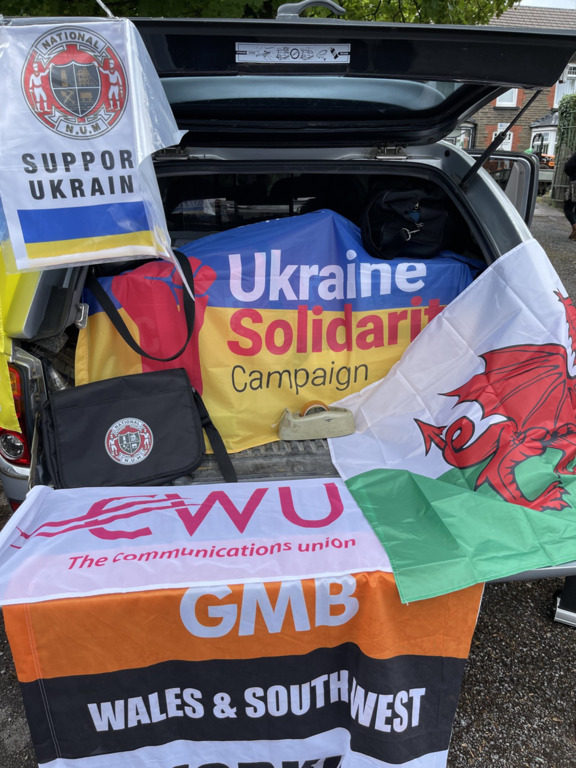
What is the reaction of society in Wales to the war in Ukraine?
There is overwhelming support for Ukraine amongst the people of Wales. Welsh government policy is that Wales is a Nation of Sanctuary and we support all refugees who come to our country. We have supported Afghanistan refugees and also from Syria. Now it is mainly Ukrainians. We have some 5,000 Ukrainians in Wales. Half have come under the Homes for Ukraine system set up by the UK Government but the remaining half have come where the Welsh Government is the sponsor.
Providing independent accommodation is a real challenge as we have a shortage of adequate housing.
The challenges though are enormous. The first minister of Wales and the Welsh Government are directly involved in coordinating support for our Ukrainian guests for as long as they are with us.
Many families have taken Ukrainians to their hearts.
In respect of the war itself, most on the left are supportive of Ukraine and the need to provide arms. There are some elements of the left that continue to see the issue as being a problem of NATO expansionism but they are a minority. Some trade unions have also been very supportive such as the mineworkers union and train drivers. Other unions are coming on board in a more proactive way but there is still a long way to go. There has been little coordinated leadership from the Congress of Trade Unions. We are working to change this.
Describe your humanitarian trip. Why did you decide to do humanitarian aid? What was delivered and to whom?
The trip to Lviv was the result of a request for support from the Ukrainian miners union in Pavlograd. The Mineworkers Union responded with a substantial financial donation and some other unions came on board to enable the purchase of a pick-up vehicle and to acquire specialist medical equipment and aid. Consequently, myself and Wayne Thomas the Welsh representative of the Mineworkers union and Deputy president of the UK Mineworkers union drove the vehicle and equipment to Lviv where it was picked up by a representative of the Union and military.
We plan to make further deliveries. At the moment we are pressing trade unions to increase and coordinate support.
For those of us on the left, democratic socialists, we felt it was important that we actually delivered concrete support to those Ukrainian trade unionists and workers who are fighting to defend Ukraine. Building working class solidarity is fundamentally important to us. We are slowly defeating the arguments of parts of the left who seem to be more aligned with the far-right over Ukraine repeating Putin’s propaganda.
Other trade unions are now planning delegations to Ukraine and hopefully this will build support over the coming months. We are also building support from the Welsh and Scottish Parliaments as well as within the Labour Party in the UK Parliament.
The challenge comes as the media focus on the war in Ukraine diminishes. It is important that our comrades in the UK fully understand that a new fascism has emerged in Europe – Russian Fascism and it cannot be appeased but has to be defeated. This is the lesson we have learned from the past.
Solidarity with Ukraine convoys
Humanitarian aid has become one of the main manifestations of solidarity for the international left with Ukraine. From different parts of the world, leftists bought body armour, helmets, medical supplies, generators, thermographic cameras, uniforms, as well as more basic things, such as hygiene products, water and food. Many left-wing and trade union organisations began to unite to fulfil humanitarian needs in Ukraine.
Italian autonomists support solidarity kitchens in Lviv, and Spanish Trotskyists organised fund-raising for the Ukrainian anti-authoritarian initiative ‘Solidarity Collectives.’
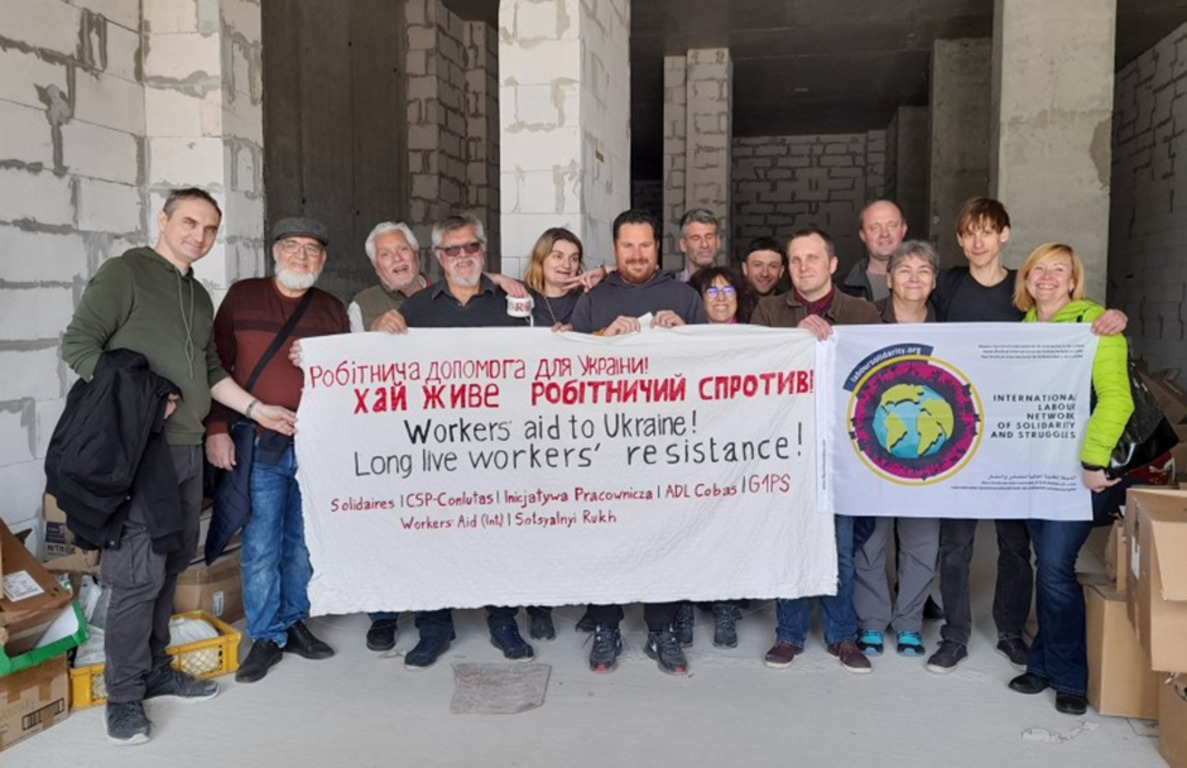
On 1 May, activists from various initiatives from Brazil, Poland, Lithuania, France, Switzerland and Bosnia organised a May Day solidarity convoy which included humanitarian aid for doctors, trade unions and soldiers at the front. This convoy helped establish communication between various leftist forces and marked the beginning of fruitful cooperation between international socialists and Ukrainian trade unionists, with further convoys from organisations, such as OZZ Inicjatywa Pracownicza, Brigate Volontarie per l’Emergenza and many others.
The left around the world actively supports Ukraine and is involved in assistance at all levels — from grassroots activism and crowdfunding to the stands of parliaments. Solidarity, the idea on which the left movements are based, is reuniting thousands of people all over the world, building new bonds and creating a new force that fundamentally defends the struggle for universal emancipation, including the right of peoples to self-determination, protection and security.
Footnotes
- ^ Westplaining is a form of gaslighting that imposes Western views through the heads of residents of Central and Eastern Europe, particularly Ukrainians.
- ^ The editors of the Commons Journal have done the same. — ed.
Cover: Kateryna Gritseva

